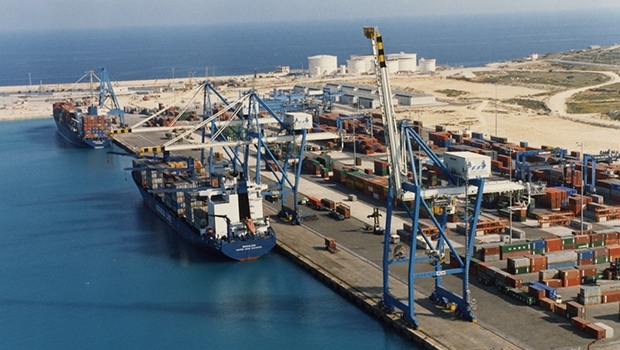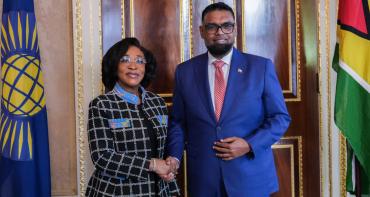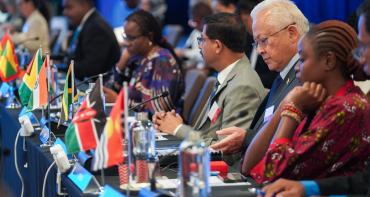Declaration on the Commonwealth Connectivity Agenda for Trade and Investment

Declaration on the Commonwealth Connectivity Agenda for Trade and Investment
We, the Heads of Government representing member countries of the Commonwealth and one third of the world’s population recognise international trade and investment as an engine for generating inclusive and participative economic growth and a means to deliver the 2030 Agenda for Sustainable Development.
Recalling our previous statement issued in Kotte in 2013 and the Malta Communique in 2015, and mindful of the intra-Commonwealth trade and investment potential as demonstrated in the 2015 and 2018 Commonwealth Trade Reviews, we stress the importance of international trade and investment in boosting employment and income in our countries and helping them achieve the Sustainable Development Goals (SDGs).
We take note of the statement delivered by Malta at the 11th WTO Ministerial Conference and we affirm our commitment to free trade in a transparent, inclusive, fair, and open rules-based multilateral trading system as a foundation for economic development and growth. We encourage member countries to work collectively towards strengthening the system and on trade issues which will lead to more prosperity in the world economy.
In particular, we recognise the importance of the multilateral trading system in ensuring the integration of small, vulnerable and least developed countries and countries in sub-Saharan Africa, the Caribbean and the Pacific into the world economy, and welcome initiatives which will support greater and more effective participation of these countries in international trade.
With members drawn from every geographic region and every level of development, we affirm the role the Commonwealth can play in supporting global growth, creating employment, the sharing of best practices and learning and promoting development among its members.
To promote the realisation of these goals, we hereby launch the Commonwealth Connectivity Agenda for Trade and Investment.
This Agenda will be guided by the principles that: co-operation should be pragmatic and practical, leading to credible results; take into account regional integration initiatives; take into account the needs of small and vulnerable economies and least developed countries; avoid duplication with initiatives where other organisations are already working; add value in areas of engagement; and adopt a progressive approach towards a long term vision for closer trade and investment ties. It should also recognise the vital role of the private sector in delivering the 2030 Agenda and facilitating the promotion of the blue and green economy.
In pursuing the Agenda, member countries will structure dialogue around the following clusters:
- Physical Connectivity, engaging on trade facilitation, identifying and facilitating implementation issues, infrastructure development including multi-sectoral connectivity and the sharing of trade information, in order to reduce the physical barriers to trade;
- Digital Connectivity, assisting member countries in expanding ICT capabilities, identifying areas for developing their national digital economies, improving their regulatory framework and building digital infrastructure, inter alia through capacity building and promoting investments, to enable all members to take advantage of the opportunities presented by digital trade;
- Regulatory Connectivity, improving understanding of various regulatory regimes, increasing the ease of doing business, promoting good regulatory practice including regulatory cooperation among member countries to reduce non-tariff barriers, improving services data collection, and mutual recognition, in order to reduce regulatory barriers, address the capacity deficit and improve the regulatory environment for business, especially micro, small and medium enterprises and consumers;
- Business-to-Business Connectivity, supporting dialogue between the public and private sectors and between businesses, assisting member countries to attract investment through capacity building, facilitating the needs of the micro, small and medium enterprises to access finance, and reflecting on how domestic regimes could facilitate business-to-business connectivity, particularly with the aim of enhancing the private sector’s role in promoting the blue and green economy;
- Supply Side Connectivity, encouraging the participation of all members in global value chains, fostering global value chains (GVC) linkages and sharing knowledge among members and harnessing them for economic growth, as well as the creation of export diversification opportunities for micro, small and medium enterprises, and exploring possibilities to collaborate on national trade portals, and
- In engaging in these areas, member countries will mainstream inclusive and sustainable trade as a cross-cutting issue. The Commonwealth will deepen collaboration with other organisations in identifying issues affecting the sustainability of economies. We affirm our commitment to making trade and investment truly inclusive by encouraging the participation of women and youth in business activities, by taking a gender responsive approach to the development of trade policy, increasing opportunities for women to trade internationally, and breaking down gender barriers in all sectors. We undertake to invest in programmes to tackle youth unemployment and give young people access to meaningful opportunities.
Issued at the Commonwealth Heads of Government Meeting, London, United Kingdom, 16 – 20 April 2018.



